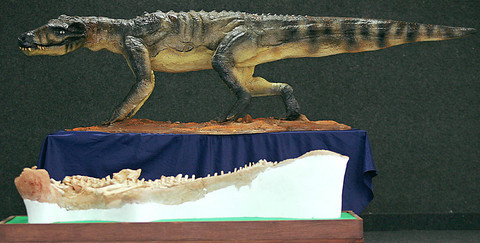Brazilian paleontologists last week proudly put on display a skeleton of a crocodile that roamed the earth in the time of the dinosaurs 90 million years ago.
The remains of the Baurusuchus salgadoensis were well preserved and included a complete head, said Pedro Henrique Nobre from the University of Rio department of geology, where the presentation was held.
"Finding a fossil is rare, but finding a collection of fossils [from the same animal] is even more rare and finding an intact head is extraordinary," Nobre said.

PHOTO: AP
The Baurusuchus was 3.5m long, and scientists estimate it weighed 400kg.
The paleontologists also presented a life-size reconstruction of what they believe the creature looked like.
The Baurusuchus remains were found 15 years ago in the western region of the state of Sao Paulo. It is the first time they have gone on display after years of restoration.
Unlike modern-day crocodiles, the Baurusuchus lived on land in a dry area. The location of the creature's nasal pasages indicated that it could not spend much time underwater, Nobre said.
The reptile had longer and more powerful rear legs than modern crocodiles, and the animal's teeth indicte that it was an active predator, he added.
The Baurusuchus belongs to the same family of ancient reptiles whose remains have been found in Argentina, southern Africa and the region between India and Pakistan. The scientists said their discovery suggests that an ancient land bridge linked South America to Indo-Pakistan.
The creature lived in the Cretaceous period, which lasted from 144 to 65 million years ago. It was the last period during which dinosaurs lived.

Towering high above Taiwan’s capital city at 508 meters, Taipei 101 dominates the skyline. The earthquake-proof skyscraper of steel and glass has captured the imagination of professional rock climber Alex Honnold for more than a decade. Tomorrow morning, he will climb it in his signature free solo style — without ropes or protective equipment. And Netflix will broadcast it — live. The event’s announcement has drawn both excitement and trepidation, as well as some concerns over the ethical implications of attempting such a high-risk endeavor on live broadcast. Many have questioned Honnold’s desire to continues his free-solo climbs now that he’s a

As Taiwan’s second most populous city, Taichung looms large in the electoral map. Taiwanese political commentators describe it — along with neighboring Changhua County — as Taiwan’s “swing states” (搖擺州), which is a curious direct borrowing from American election terminology. In the early post-Martial Law era, Taichung was referred to as a “desert of democracy” because while the Democratic Progressive Party (DPP) was winning elections in the north and south, Taichung remained staunchly loyal to the Chinese Nationalist Party (KMT). That changed over time, but in both Changhua and Taichung, the DPP still suffers from a “one-term curse,” with the

Jan. 26 to Feb. 1 Nearly 90 years after it was last recorded, the Basay language was taught in a classroom for the first time in September last year. Over the following three months, students learned its sounds along with the customs and folktales of the Ketagalan people, who once spoke it across northern Taiwan. Although each Ketagalan settlement had its own language, Basay functioned as a common trade language. By the late 19th century, it had largely fallen out of daily use as speakers shifted to Hoklo (commonly known as Taiwanese), surviving only in fragments remembered by the elderly. In

William Liu (劉家君) moved to Kaohsiung from Nantou to live with his boyfriend Reg Hong (洪嘉佑). “In Nantou, people do not support gay rights at all and never even talk about it. Living here made me optimistic and made me realize how much I can express myself,” Liu tells the Taipei Times. Hong and his friend Cony Hsieh (謝昀希) are both active in several LGBT groups and organizations in Kaohsiung. They were among the people behind the city’s 16th Pride event in November last year, which gathered over 35,000 people. Along with others, they clearly see Kaohsiung as the nexus of LGBT rights.